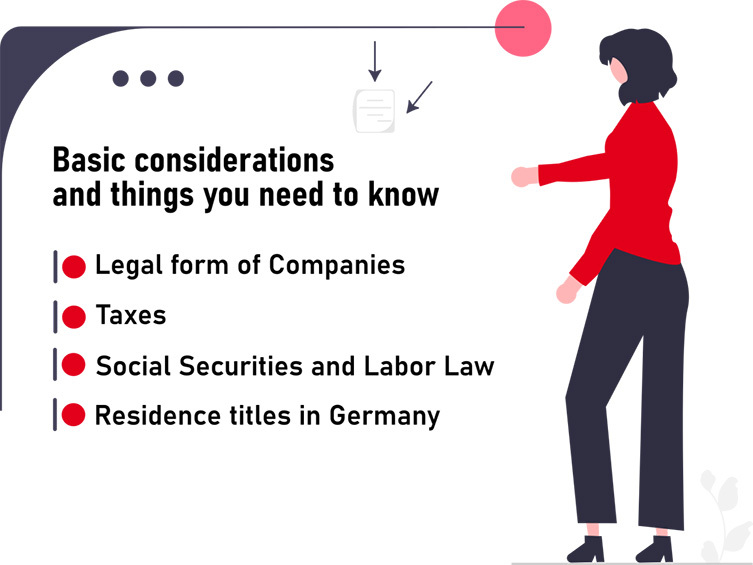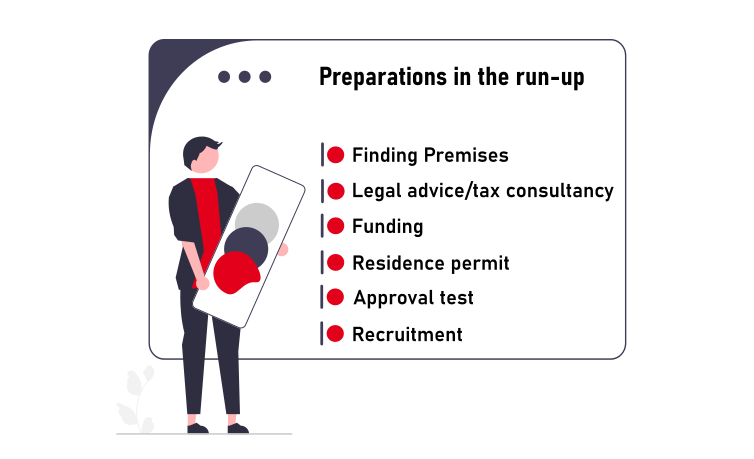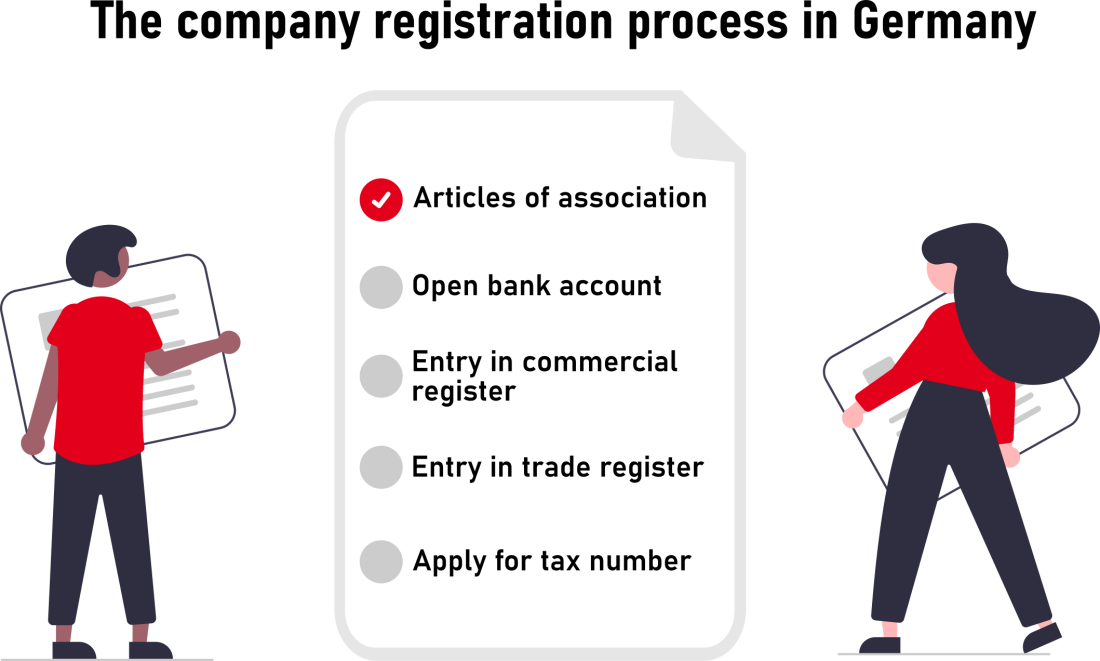Setting Up an Enterprise in Germany
Investing in BremenHelpful tips when starting a business in Germany

Setting up an enterprise in Germany opens up a myriad of new opportunities. New sales markets, excellent infrastructure and a well-educated workforce. But how do you go about setting up your own business here? Here are the details you need in our guide.
Having your own company abroad – there's a lot to learn. The laws and regulations there will be different from in your home country. Some processes take much longer, or involve more time and effort, whereas others are much quicker and easier. These guidelines will outline the steps you need to take, the things you need to take into consideration right from the start and, most importantly, what support you can receive.
Throughout Germany, and particularly here in Bremen, we're delighted to meet new people who want to change the world with their ideas or who simply want to turn their dreams into reality. Germany offers enormous opportunities for commercial success. And we will help you start up your own company.
Setting Up an Enterprise in Germany - Table of Contents

-
Basic considerations and things you need to know in advance
You are in the best position to know why you want to set up a company in Germany, what you expect from your new location and whether your business is ready for expansion. Obviously, we don't want to take these decisions away from you.
Research about Germany as an enterprise location
You'll find any additional information you need about Germany as a location on the Germany Trade & Invest web pages.
There's more information about Bremen as a location in North Germany here.
Maybe you've already researched the market and discovered why you want to come to Germany or maybe you've visited the country and got to know the culture. Now it's time to investigate the business environment in greater detail. To do this, you should familiarise yourself with the underlying principles of economic activity in Germany. That isn't difficult:
You'll need to make a number of decisions: What should your premises look like? What legal form should your business have? What type of business do you want to run from here? What type of personnel do you need?
You'll need a bit of background knowledge to answer these questions. First of all, find out what's involved in the type of business:
a) Legal form of companies
Representative Office
Representative Offices, i.e. small branch offices, can be established without any formation formalities. They cannot trade or contract in their own name but mainly act in matters like market development, research and networking on behalf of their parent corporations.
Branch Office
In contrast to a subsidiary, a branch (Zweigniederlassung) is not a separate legal entity distinct from the parent company. A branch may, however, be sufficiently self-supporting and able to operate independently. It must have its own office, bank account and bookkeeping. The branch manager has to be a senior executive to whom a general or full power of representation has been issued (Prokurist) or a general agent (Handlungsbevollmächtigter). Each branch of this type has to be registered in the Commercial Register (Handelsregister) of the respective district's local court (Amtsgericht).
If the branch is formed by a foreign corporation or other legal entity, a certified (beglaubigt) copy of the corporation's articles of incorporation together with a certified German translation thereof must be submitted to the commercial register. The application has to be duly notarized (beurkundet). All substantial changes with regard to the parent company must also be communicated to the commercial register of the branch (e.g. relocation, revocation of managing directors).
Sole Proprietorship
An individual may choose a sole proprietorship (Einzelunternehmen) as business organization. In this case, all their business assets as well as their private assets are subject to their liability for business debts. From a certain size of business operation (approx. 250,000 EUR annual sales), the registration of the sole proprietorship in the commercial register is mandatory.
General Partnership (OHG)
A general partnership (Offene Handelsgesellschaft) is an association for business purposes consisting of two or more partners. In spite of the fact that a general partnership is no separate legal entity, it can perfom its business activities in its own name. The liability of the partners, however, is not restricted but covers the business assets as well as private assets. The partners can be held liable jointly and separately. The profit and loss portion of each partner is laid down in the partnership agreement. The general partnership must be registered in the commercial register.
Limited Partnership (KG)
A limited partnership (Kommanditgesellschaft) has at least one general partner and one or more limited partners. Whereas the liability of the general partner for business debts is not restricted, the liability of the limited partners is limited to their capital contribution mentioned in the commercial register. The restriction of liability becomes effective upon registration of the KG in the commercial register which is mandatory.
Stock Corporation (AG)
The legal form of a stock corporation (Aktiengesellschaft) is normally used if it is intended to raise equity capital by going public and sell shares at the stock exchanges. The AG is formed by one or more persons who need not be resident in Germany.
Limited Liability Company (GmbH)
The German Limited Liabilities Companies Act (GmbH-Gesetz) provides for two options: The standard GmbH with a minimum share capital of 25,000 EUR and the so-called ‘Entrepreneurial company with limited liability’ (Unternehmergesellschaft [haftungsbeschränkt] or UG [haftungsbeschränkt]). The UG is not a separate legal form, but only a type of the GmbH without a given minimum share capital. The UG, however, may not distribute profits in full, but has to allocate 25% of the annual net profit to the statutory reserve in order to accrue the minimum share capital of a standard GmbH by and by. The foundation of a GmbH requires relatively few formalities by which it comes into existence as a legal entity. They have to be completed in due notarized form.
For more Information on the legal entities, view our brochure “Setting up an enterprise in Germany”, which can be downloaded here.
b) Taxes
Germany has a complex tax system which comprises federal, state and municipal taxes. German taxes are often grouped into:
- Taxes on income
- Taxes on capital
- Taxes on transactions and on consumption (excise taxes)
The taxes on income are represented by the personal income tax (Einkommensteuer) levied on natural persons, sole proprietors and partners of a partnership, the corporate income tax (Körperschaftsteuer) on the profits of corporations, the capital gains tax (Kapitalertragsteuer) and the trade tax (Gewerbesteuer) on the business profit earned by any business regardless of its legal form. The corporate income tax, the capital gains tax and - under certain conditions - the personal income tax are supplemented by a surcharge, the so-called solidarity surcharge (Solidaritätszuschlag).
After the abolition of net assets tax and trade tax on capital towards the end of the last century, the land tax (Grundsteuer) is now the only significant remaining tax levied on business assets.
The transactions and excise taxes are often referred to as 'indirect taxes' and are represented first and foremost by the turnover tax (Umsatzsteuer / value-added tax VAT), followed by excise taxes on fuel oil, tobacco, alcohol etc., insurance tax, and land transfer tax (Grunderwerbsteuer) levied on changes in ownership of property.
The Fiscal Code (Abgabenordnung) specifies that international obligations shall take precedence over domestic law. This not only refers to the fact that EU community law prevails over national law, but also to Germany's wide network of double taxation agreements which are currently in force with almost one hundred countries.
Generally, residents of Germany are subject to tax on their worldwide income (unlimited tax liability / unbeschränkte Steuerpflicht). Individuals not resident in Germany are subject to tax only on income derived from German sources (limited tax liability / beschränkte Steuerpflicht). For tax purposes, individuals are considered to be resident in Germany if they have their domicile in the country or are present in Germany for a period of more than six months.
c) Social Security and Labor Law
The German social security system provides for:
- Pension Insurance (Rentenversicherung)
- Statutory Health Insurance (Gesetzliche Krankenversicherung)
- Unemployment Insurance (Arbeitslosenversicherung)
- Care Insurance (Pflegeversicherung)
- Employers’ Liability Insurance (Berufsgenossenschaft / Unfallversicherung)
In general, all employees working in Germany are subject to mandatory insurance, regardless of their citizenship or the residence of the employer. Apart from the employers’ liability insurance (statutory accident insurance) which is borne in full by the employer, the contributions to the insurance are paid in equal amounts (exceptions see below) by employer and employee. Basis for the contributions are the employee's earnings. The employer's portion is not considered taxable income of the employee. The employer is liable for the total payment of the contributions to the social security institutions and has to withhold the employee's portion from wages or salaries.
Employees temporarily delegated by a foreign employer to a German branch or subsidiary are in special cases exempt from German social security. In such case, the employee must be able to prove their intention to return to the home country and must remain on the foreign payroll, and the foreign employer must retain the crucial employer functions such as the determination of salary, promotion, transfer etc.
There are also many labor laws which regulate many aspects of the working life. Minimum Wage, Working Hours, Holidays, Sickness leave, maternity protection, termination rights and the right to form a worker council are just some of them.
d) Residence titles in Germany
There are a number of different ways and possibilities to stay in Germany. The easiest way is for citizens of the EU. EU citizens have the right to enter, reside and work in any EU member state and - for stays of less than 90 days - only require a valid identity document or passport. Upon taking up residence in Germany resp. after 90 days at the latest, EU citizens are required to register with the relevant registration authority.
Non-EU Nationals
Citizens from non-EU states who want to stay in Germany for more than 90 days need a residence title to do so. Before entering Germany they have to obtain a corresponding visa (category 'D') from the competent mission abroad (Embassy or Consulate General). Only citizens of Australia, Canada, Israel, Japan, New Zealand, the Republic of Korea, the United Kingdom of Great Britain and Northern Ireland, and the United States of America may obtain any residence permit after entering Germany. Visa applications must be approved by the migration office of that place in Germany where the applicant intends to take up residence. The approval procedure usually takes at least 3 months.
For more information, please visit the website of the German Foreign Office.
Help with setting up an enterprise in Germany
A number of different institutions in Germany can help you with approvals and getting started in a new country. In Bremen, this is our Welcome Service. Not only does the Welcome Service guide companies through the bureaucratic requirements, it also helps employees with their first steps here, such as looking for accommodation, finding language courses or helping them with the local authorities. The welcome service also provides support for the deployment of the additional members of staff that will be needed if your company grows.

-
Looking for a location
Once you've become familiar with the basic requirements for companies in Germany, you can move on to the next step: Looking for a location.
Companies use "locational factors" when deciding where to base their operations. These factors are many and varied. There are the hard locational factors. These include, for example:
- size and availability of commercial premises
- property prices, rents, property taxes and business rates
- the availability of subsidies
- wage costs
In contrast, soft locational factors can't be expressed in monetary terms. They include:
- quality of life for potential employees
- attractiveness of a location as a place to live and work
- the quality of services provided by local authorities
Bremen is a good example of a business location in North Germany. It offers a variety of attractive locational factors – for example, excellent infrastructure, especially for companies involved in the export business. The cost of living and commercial rents are lower here than in other German cities. At the same time, the quality of life in Bremen is comparatively high. With its well-established traditions and vibrant culture, this greenest among the large cities in Germany is an exceptionally enjoyable place to live in.
Bremen has already made a name for itself, especially in the aviation and aerospace, logistics, automotive, food and beverage sectors and also in the digital economy, and offers companies an attractive location and huge help with business start-up.
Of course, the best way to decide on a location is to visit the place and have a look around the region yourself. The local business development associations are happy to welcome delegations and will show you the plus points of their location. In Bremen, we're happy to take you around and show you why so many companies from abroad are interested in our North Germany city with its deep historical roots!

-
Preparations in the run-up to starting your enterprise
Once you've decided on the form your company is to take and found a location, the next thing is to find suitable premises and create the right framework conditions. Do you need an office, a warehouse or a production facility? Will you bring in your own employees, or look for staff locally? Do you want a grant, or do you need a loan? You should consider all these things carefully:
a) Finding premises
In comparison to many non-Western nations, purchasing or renting land is expensive and vacancy levels are low, especially in the large metropolitan areas. Commercial leasing contracts usually run for several years. For this reason, it is important to choose the right kind of premises. They should have enough room for expansion but not be so big that they cause excessive costs.
If you initially only need office space, co-working spaces are an attractive option to start with. They are available on short-term rents, from month to month. This means companies can react quickly to their changing needs.
The World Trade Centers provide an ideal all-round service. These centres have been created with the aim of helping foreign companies make a start by providing office packages, expert advice and comprehensive services. They have WiFi, conference rooms and even a coffee machine – in fact, everything a business needs.
b) Legal advice/tax consultancy
Legal requirements and taxation law in Germany involve a multitude of rules, regulations and legislation. It's almost impossible to set up a company without getting advice about taxation and the legal situation. We therefore recommend that companies find a specialist local tax advisor and also engage a legal consultant.
This will happen as part of the company registration process, as detailed in all the remaining steps in section 4 of this document.
c) Funding
Investing in a new location is expensive, especially if new production or warehousing capacity is being created. Germany has a range of funding programmes that offer companies grants or loans to reduce commercial risk and enable investment.
These programmes run at three different levels: At federal level, for example, the KfW bank (Germany's state-owned investment and development bank), at federal state level and at local level. These programmes can vary depending on where the company is to be located.
An example: In Bremen, the BAB (business development bank) provides low-interest credit lines or loans to help companies expand, purchase property and machinery or for research and development. It also enables companies to access federal-level funding programmes. The bank's advisers provide support from the very start and help find the right funding programme. As part of the process for establishing new businesses, we at Bremeninvest are happy to set up contacts with the BAB.
d) Residence permit
As already mentioned, if employees are sent to work in Germany, from their home country, they will need the right kind of visa or residence permit. Depending on their country of origin (EU or non-EU), this process can take some time and employers should allow at least six months.
To view all the requirements, visit http://www.auswaertiges-amt.de
e) Approval test
A whole range of professions in Germany are protected. This means that they can only be performed by specific people who have the proper certification. That includes professions such as doctors, lawyers and architects. In addition, there are a number of trades that can only be practised by tradespeople who have passed their master craftsman examinations. Only certified master craftsmen/craftswomen can run their own businesses.
The relevant government bodies and trade associations conduct what are known as approval tests to identify whether someone can set up this kind of business.
f) Recruitment
Recruiting staff isn't an easy matter, especially from a distance. For this reason, many regions offer recruitment support. In Bremen, you can start with the welcome service and with us at Bremeninvest.
Reducing complexity – finding support in setting up an enterprise
There's so much involved in establishing and setting up an enterprise in Germany. It's a challenge for Germans and non-Germans alike. However, having the right help makes it easier. And Bremeninvest provides this support, free-of-charge. We guide companies that are interested in this location, right from when they first start thinking of setting up here. We help in deciding about investment, in finding premises and with all the formalities involved in setting up a business, including questions about personnel and arrivals to Germany. Don't hesitate to contact us!
Contact us: Andreas Gerber, +49 (0) 421 9600-123, gerber@bremen-invest.com

-
The company registration process in Germany
So, have you worked through all the previous steps, made your decisions about investment and are now ready to set up your company? Then there's only a few steps left to complete. However, you should leave yourself enough time for them. The verification and approvals processes can sometimes take a while. These guidelines should be helpful:
5 Steps in registering a company
1. Articles of association
First of all, have articles of association drawn up for the type of company you have selected. These articles define, for example, the purpose of your business, the company name, who the shareholders are and how much capital it has. The contract is a requirement for founding most types of company, such as the GmbH (limited company). Sole traders do not usually need this type of contract. It's generally a good idea to get a lawyer to help you draw up the articles of association.
2. Open a bank account
At the same time, you need to open a German bank account, from which you pay in the nominal capital (e.g. 25,000 Euros for setting up a GmbH (limited company)). A number of banks also offer accounts for non-EU citizens.
However, the registration process doesn't always run smoothly. Online banks are often suitable for business accounts. For example, the accounts offered by penta might be an option. At Bremeninvest, we'll happily help you with all the formalities, help you overcome language barriers and help with arranging things. Just get in touch with us!
3. Entry in the Commercial Register
Once you can provide proof that you have paid in the nominal capital and present your articles of association, you can officially register your company. An entry in the Commercial Register is required for many types of company (e.g. registered traders (e. K.), incorporated companies (GmbH, UG, AG) and commercial partnerships (oHG, KG, GmbH & Co. KG). A notary will do this for you.
4. Entry in the Trade Register
If you are going to practice a trade, you will need to enter your company in the Trade Register. This entry will be made by an institution, which differs according to the location. In the German Federal State of Bremen, welcome service will help you do this.
5. Apply for a tax number
Finally, every company needs a tax number by which the local Tax Office can identify it. Your tax advisor will do this for you.
You've done it!
You have set up your company in Germany and can now finally get started! Even if there's a lot involved, it's really worthwhile. For example, from Bremen, you have easy access to the entire European market and have the potential to acquire hundreds of millions of customers.
If you need a little help along the way, simply contact us at any time. We'll be happy to help you, free of charge.
Success Stories
Bremen’s Economy in Figures: Statistics 2025
The State of Bremen is a strong economic hub. A look at the latest statistics highlights its economic strength — summarising key data such as cargo volumes, export performance, industry turnover, and more.
Learn moreMedium-Sized Companies in Bremen Showcasing the Full Range of the Local Economy
Medium-sized companies form the backbone of Bremen’s economy. They create jobs and produce goods that are in demand worldwide. Here is a selection of ten businesses that illustrate the diversity of Bremen’s economic landscape.
Learn moreTwelve international food and beverage companies in Bremen
Becks and Melitta may be high-profile brands, but international food and beverage companies also manufacture lots of other products in Bremen and Bremerhaven. Here are twelve examples.
Learn more

